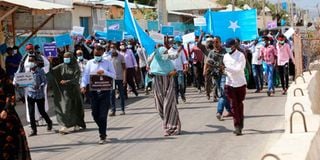Premium
Hope as countries in Horn of Africa hold democratic polls

Opposition supporters demonstrate in Mogadishu on February 19, 2021 to demand elections.
What you need to know:
- In the Horn, Ethiopia and Somalia have faced external pressure to end armed conflict and hold elections.
- In Somalia, President Mohamed Abdullahi “Farmaajo”, whose term expired on February 8, 2021, has been in office since the February 2017 election.
Despite a global democratic roll-back, Africa continues to routinely hold elections. In 2021, some 13 national elections are slated to take place on the continent, four of them in the turbulent Horn of Africa.
The long-delayed presidential election in Somalia will be held on October 10. On June 21, Ethiopia finally held parliamentary polls – which Prime Minister Abiy Ahmed’s Prosperity Party is tipped to win.
In Djibouti, on April 8, Ismail Guelleh was re-elected for the fifth term as President of the Horn’s “little-friendly dictatorship”. And in January 2021, Uganda’s President Yoweri Museveni was re-elected to a sixth term in an election marred with violence.
Five of the 13 countries holding elections in 2021(Chad, Ethiopia, Libya, Niger and Somalia) are embroiled in armed conflict while transitions are trapped between autocracy and democracy. In the Horn, Ethiopia and Somalia have faced external pressure to end armed conflict and hold elections.
Many elections are held largely to render a veneer of legitimacy to leaders who have no popular mandate. Stanford University Political Science Professor, Terry Karl, coined the concept of “electoralism” to describe a “half-way” transition from tyranny to democratic rule. Electoralism is characterised by absence of rule of law and democratic institutions, fraud or intimidation and the whole electoral system tends to favour the victory of the incumbent elite of the dominant party system.
In Somalia, President Mohamed Abdullahi “Farmaajo”, whose term expired on February 8, 2021, has been in office since the February 2017 election. Farmaajo initially promised to lead Somalia towards universal suffrage, but a plan for direct parliamentary elections was abandoned in September 2020. It was to be preceded by legislative election. Instead, Farmaajo moved to undermine federalism and centralise power in Mogadishu.
Unprecedented constitutional crisis
From the outset, Villa Somalia meddled in elections to install loyalists in the states. With the help of Ethiopian military, Mogadishu abducted and jailed rival candidates such as Muktar Robow.
The federal state Presidents of Puntland (Said Deni) and Jubaland (Ahmed Madobe) and the 14-member Council of Presidential Candidates backed by civil society stopped recognising Farmaajo as the President of Somalia.
In April, Farmaajo signed a controversial law extending his mandate for two years, triggering an unprecedented constitutional crisis. The African Union, European Union and the United Nations rejected the move. Autocracy reached an all-time high since Said Barre’s regime. Peaceful protesters were shot and killed by government forces and opposition leaders were targeted in assassination attempts.
But Farmaajo capitulated to pressure and renounced his term extension. Prime Minister Mohamed Hussein Roble brokered a new deal: the upper house elections to be held on July 25, the lower house’s between August 10 and September 10 and the two houses to convene and vote for the president on October 10.
A new book by political analyst and Somali National Council chairman Ismail D. Osman, The Accidental President: Corruption and Clannism: Farmajo’s Betrayal of the Somali People, will hit the market on September 10, 2021.
Igad, the African Union and the international community should exert pressure on Villa Somalia to faithfully implement the election schedule.
Perfect system of electoralism
In Ethiopia, Prime Minister Abiy inherited a perfect system of ‘electoralism’. The ruling Ethiopian People’s Revolutionary Democratic Front (EPRDF), in power since 1991, won every seat in the 2015 election, which was marred by allegations of widespread repression and rigging. Abiy came to power in April 2018, after months of public protests that put Ethiopia on the edge of a revolution.
A former political prisoner, Birtukan Mideksa, was appointed to chair the country’s overhauled electoral commission. Abiy received the 2019 Nobel Peace Prize mainly to encourage further reforms and avert turmoil along ethnic lines.
Abiy replaced EPRDF – a TPLF-dominated alliance of four ethnically based parties – with his new Prosperity Party to centralise power and move Ethiopia away from EPRDF’s ethnic federalism. His philosophy of “Medemer” – or “coming together” –carried eerie echoes of one-party slogans across Africa. He used the Covid-19 pandemic as a subterfuge to extend his stay in office after his term expired in September 2020. This stoked the anger of TPLF and other opposition parties. A pre-emptive strike against Tigray to prevent larger regions from following suit and to consolidate a new dictatorship led to a civil war.
The central government faced international pressure for a ceasefire in the crisis-torn Tigray region. Abiy capitulated and held parliamentary elections on June 21, which he hailed as the nation’s first attempt at free and fair elections.
Although the National Election Board of Ethiopia said more than 40 parties fielded candidates, leading opposition parties such as the Oromo Liberation Front (OLF), one of the oldest and with a huge following in Oromia, boycotted the polls.
Instability affected the registration, turnout and the participation of some major opposition parties. Polls did not take place in nine parts of the country facing political violence including Afar, the Somali region, Amhara, Oromia, Harar, Benishangul-Gumuz, South Wollo, Tigray and Southern nationalities. In the Somali and Harar regions, the polls were postponed to September 2021 due to logistical challenges and disputes. In total, 102 of the 547 constituencies including the 38 constituencies in Tigray did not vote. Blissfully, Addis Ababa has declared a ceasefire in the Tigray region. Ethiopia must now organise an all-inclusive national convention to negotiate a new social contract to underpin a new democratic order.
Professor Peter Kagwanja is a former Government Adviser and Currently Chief Executive at the Africa Policy Institute





